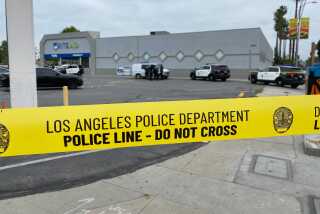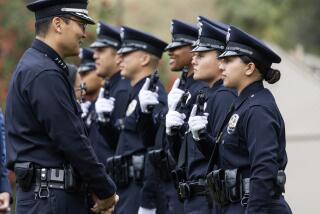Readers React: L.A. police could have used more military gear in 1997
- Share via
To the editor: Let’s step back and take a logical look at the military equipment and how it can be used by police. (“Demilitarizing America’s police,” editorial, May 19)
A grenade launcher can be adapted to propel tear gas to disperse rioting crowds intent on burning down buildings, or it can shoot smoke canisters to provide cover for rescuing hostages. An armored vehicle can be used to rescue crime victims.
Think back to the North Hollywood bank robbery and shootout in 1997. The Los Angeles Police Department had to commandeer a nearby armored truck that could withstand withering gunfire to pull victims out of the line of fire.
If a situation arises in which police need to use deadly force to protect themselves as well as law-abiding citizens, an assault rifle capable of precision shots is the best way to stop the threat. If a terrorist event happens like we just experienced in Texas, local law enforcement is the first to respond, not the military.
John Henry, Culver City
..
To the editor: A reader worries that taking military-strength weapons and vehicles away from municipal police could backfire when, inevitably, terrorist attacks take place on American soil. (“What if the police need those military weapons?,” Readers React, May 19)
Aside from the fact that the odds of a successful U.S. attack are (still) quite remote, there are two obvious facts that need to be acknowledged.
First, militarized police actions would necessarily be after the fact and useless for prevention. Second, Americans are lucky enough to have two federal agencies charged with militarized action on U.S. soil: the FBI and the National Guard.
It should be obvious that, rather than obsess over the remote possibility of a foreign attack and militarizing civilian law enforcement to prepare for one, the more important duty of America’s police forces is to serve their communities, particularly by refraining from becoming an occupying force over a despairing citizenry.
Eric Oxenberg, Los Angeles
Follow the Opinion section on Twitter @latimesopinion and Facebook
More to Read
A cure for the common opinion
Get thought-provoking perspectives with our weekly newsletter.
You may occasionally receive promotional content from the Los Angeles Times.










